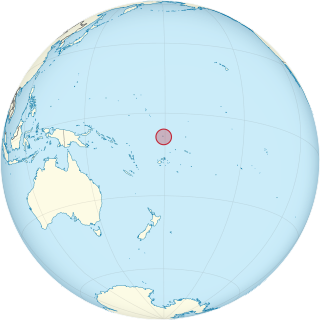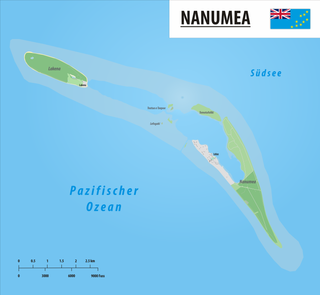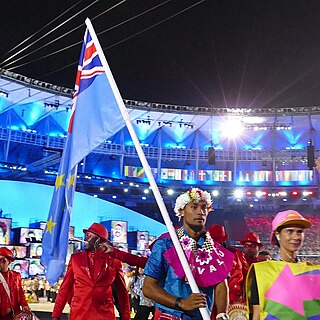Related Research Articles

Tuvalu is an island country in the Polynesian subregion of Oceania in the Pacific Ocean, about midway between Hawaii and Australia. It lies east-northeast of the Santa Cruz Islands, northeast of Vanuatu, southeast of Nauru, south of Kiribati, west of Tokelau, northwest of Samoa and Wallis and Futuna, and north of Fiji.

Demographic features of the population of Tuvalu include the age structure, ethnicity, education level, life expectancy, religious affiliations and other aspects of the population.

Tuvaluan, often called Tuvalu, is a Polynesian language closely related to the Ellicean group spoken in Tuvalu. It is more or less distantly related to all other Polynesian languages, such as Hawaiian, Māori, Tahitian, Samoan, Tokelauan and Tongan, and most closely related to the languages spoken on the Polynesian Outliers in Micronesia and Northern and Central Melanesia. Tuvaluan has borrowed considerably from Samoan, the language of Christian missionaries in the late 19th and early 20th centuries.

"Tuvalu for the Almighty" is the national anthem of Tuvalu. The lyrics and music are by Afaese Manoa. It was adopted in 1978, when the country became independent from the United Kingdom. It is also used as a motto of the country and additionally serves as the title of the Coat of arms of Tuvalu.

Nanumea is the northwesternmost atoll in the Polynesian nation of Tuvalu, a group of nine coral atolls and islands spread over about 400 miles (640 km) of the Pacific Ocean just south of the equator and west of the International Date Line. Nanumea is 4 km2 (1.5 sq mi) with a population of 512 people.

The traditional music of Tuvalu consists of dances, including fatele, fakanau and fakaseasea. The influence of the Samoan missionaries sent to Tuvalu by the London Missionary Society from the 1860s resulted in the suppression of songs about the traditional religions or magic and many songs were lost. As the influence of the missionaries diminished in the 20th century the traditional dances were revived and the siva dance tradition from Samoa also became popular.

Kioa is an island in Fiji, an outlier to Vanua Levu, one of Fiji's two main islands. Situated opposite Buca Bay, Kioa was purchased by settlers from Vaitupu atoll in Tuvalu, who came between 1947 and 1962.
Sir Tomu Malaefone Sione,, was a political figure from the Pacific nation of Tuvalu. He worked as a journalist from 1962 to 1968, and held the post of radio announcer in the Broadcasting and Information Department of the administration of the Gilbert and Ellice Islands Colony (GEIC). He was the head of the southern Niutao clan. He was married to Segali.

Seve Paeniu is a Tuvaluan politician. Paeniu was elected to the Parliament of Tuvalu in the 2019 Tuvaluan general election to represent the Nukulaelae electorate. He was appointed as the Minister of Finance in the Natano Ministry.
The Christian Church of Tuvalu, is a Christian church and is the largest religious denomination in the country. This status entitles it to "the privilege of performing special services on major national events"; its adherents comprise about 86% of the 11,600 inhabitants of the archipelago.

Tuvalu competed at the 2008 Summer Olympics in Beijing, China, from 8 to 24 August 2008. This was the nation's first ever appearance in an Olympic Game. The delegation included two track and field athletes and one weightlifter. Okilani Tinilau and Asenate Manoa participated in athletics while Logona Esau participated in the weightlifting sport. Both track and field athletes achieved national records. Logona Esau led the Tuvaluan squad as the nation's flag bearer in the parade of nations.

The following outline is provided as an overview of and topical guide to Tuvalu:
Asenate Manoa is a Tuvaluan track and field athlete who represented Tuvalu at the 2008 Summer Olympics, at the 2009 World Championships & 2011 World Championships and at the 2012 Summer Olympics. Manoa represented Tuvalu in the sport of powerlifting at the Pacific Games 2015 and won a bronze medal in the 72 kg Female category. She was the first woman to represent Tuvalu at the Olympics.

Tuvalu participates in the Olympic Games in the Summer Olympics. It has yet to compete at the Winter Olympics.

Sport is an important part of Tuvaluan culture, which sporting culture is based on traditional games and athletic activities and the adoption of some of the major international sports of the modern era.

Tuvalu competed at the 2012 Summer Olympics in London, which was held from 27 July to 12 August 2012. The country's participation at London marked its second appearance in the Summer Olympics since its debut at the 2008 Summer Olympics. The delegation consisted of three competitors: two short-distance runners, Tavevele Noa and Asenate Manoa, and one weightlifter, Tuau Lapua Lapua. All three qualified for the games through wildcard places because they did not meet the qualification standards. Lapua was the flag bearer for the opening ceremony while Manoa carried it at the closing ceremony. Noa and Manoa failed to advance beyond the preliminary rounds of their events although the latter established a new national record for the women's 100 metres, while Lapua placed 12th in the men's featherweight weightlifting competition.

Women in Tuvalu continue to maintain a traditional Polynesian culture within a predominantly Christian society. Tuvaluan cultural identity is sustained through an individual's connection to their home island. In the traditional community system in Tuvalu, each family has its own task, or salanga, to perform for the community. The skills of a family are passed on from parents to children. The women of Tuvalu participate in the traditional music of Tuvalu and in the creation of the art of Tuvalu including using cowrie and other shells in traditional handicrafts. There are opportunities of further education and paid employment with non-government organisations (NGOs) and government enterprises, education and health agencies being the primary opportunities for Tuvaluan women.

The Art of Tuvalu has traditionally been expressed in the design of clothing and traditional handicrafts such as the decoration of mats and fans. Tuvaluan clothing was traditionally made from Fala leaves.
Alesana Kleis Seluka is medical doctor by profession and is the Chairman of the Public Service Commission of Tuvalu. He represented the constituency of Nui in the Parliament of Tuvalu. He served as the Minister of Finance and Economic Planning from 1996 until 1999, and Minister of Health from 2001 to 2006 and held other Cabinet posts.
As in much of Oceania, obesity is a major health issue in Tuvalu with 65% of men and 71% of women being overweight. In 2012 the birth rate on the islands was estimated at 23 per 1,000 people and life expectancy was 65.
References
- ↑ "National Anthems of the Commonwealth: Melbourne 2006 Edition" (PDF). Naxos. 2005. p. 13. Retrieved 21 March 2021.
- ↑ "The Royal and National Anthem of Tuvalu". YouTube (video). 12 September 2010. Archived from the original on 2021-12-21. Retrieved 8 April 2014.
- ↑ "Tapumanaia & Lasela". Tapula International. 24 August 2010. Retrieved 11 March 2013.